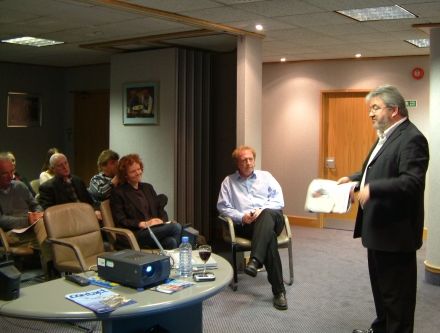Olwyn Hocking considers the future of 'The Box in the Corner'.
We're in the midst of an explosion of new technological toys. Is this a threat or an opportunity to people who make W or simply enjoy watching W "the box in the corner" ?
In the same week as the RTS explored this Big Question, the Sunday Times declared: "The end of the box is nigh".
But speaker Simon Fell, Controller of Emerging Technology at ITV , was clear that you could see the glass as half full W or perhaps even fuller. TV Anytime is the up side of the new gizmos. If commissioners and producers adapt to the needs of the new devices and consumers, there are many more hours of viewing available than can be achieved by waiting until we’re ready to sit down in front of static TV sets in our homes.
In a world of such multiplicity, appointment-to-view becomes even more valuable than now. "Talked about TV" will drive consumer use across more platforms and create more potential revenue.
Just some of the new equipment and new services described in Simon's presentation:
- mobile TV W possibly drawing on DAB signals, or using DVB-H. Trials take place in Oxford this summer
- Wi-fi is developing into Wi-Max. You can find wireless connections in more and more locations such as cafes W wi-max broadens the range to up to 15 miles, allowing local wireless broadband services. Trials are underway in Canterbury.
- Short drama clips can be downloaded onto 3G phones. Called Mobisodes, you can pay £6 for 24 1-minute original drama episodes.
- Other programming is now available W you can pay to order Big Brother for a day or download Celebrity Love Island clips.
- The BBC is trialling interactive media. Called iMP, it means consumers can select output from recent broadcasts W building on the popularity of its 7 day call-up radio service available on the internet over the last year.
Back home, after all that mobility, there's still likely to be tremendous change. Large flat plasma screens and LCD are transforming the viewing experience.
High definition has been ten years away... for decades. But it is now here W the World Cup next year will be available, and the BBC has said it will introduce HDTV by 2010. The UK is behind much of the world W will consumers here begin to catch up? One incentive may be the possibility of a high definition broadcast service on channels released as a result of the move to digital terrestrial television.
So, five years from now, what predictions did Simon make ?
In television, Freeview would edge into the lead as the main digital provider, with 12m homes compared with Sky's 10m. Our homes will have digital networks linking a variety of broadband and other services. Out of the home, different distribution routes will be combined apparently seamlessly W even now it's possible to walk around London using wireless capability to speak to US contacts via cheap internet links. And mobiles will be all-pervasive… with 1000m mobiles in use across the globe.
Simon was clear there was no choice over ITV's main goal. It must have a presence on all platforms. "ITV will need to be on every device."
And the other main goal for providers: the desire we have for personalisation has to be understood and met. "Everyone will want to pause everything."
Younger generations especially want to be in control. Anyone who's seen a teenager holding five different MSN conversations whilst on a webcam and texting a pal knows W other media devices have a lot to compete with !

Graeme Thompson (NETB Centre Chair) introduces Simon Fell (seated, centre)
By Olwyn Hocking

